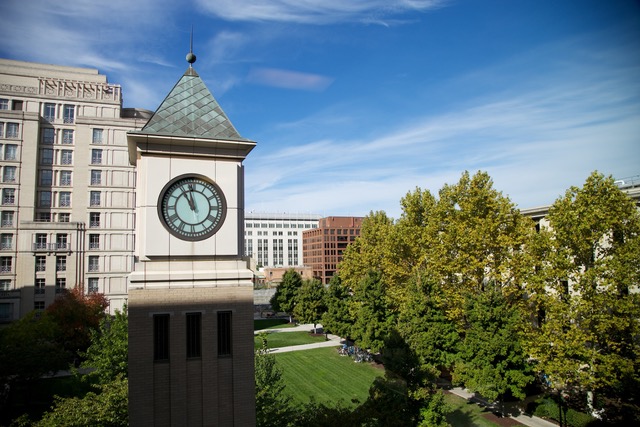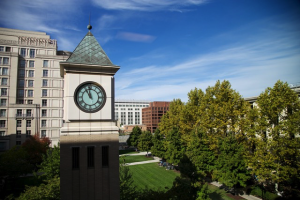Georgetown’s Institute of Constitutional Advocacy and Protection (ICAP) partnered with CASA de Maryland, an immigrant’s rights organization, to file a federal lawsuit against the coronavirus aid bill, alleging that the bill discriminates against the U.S. citizen children of undocumented immigrants.
The bill, formally called the Coronavirus Aid, Relief, and Economic Security Act, was passed to offer Americans financial aid through direct stimulus checks due to the economic challenges caused by COVID-19. The $2 trillion package allocated $1,200 to each tax-paying U.S. adult and $500 per child for households with an annual income of $75,000 or less. The relief package passed the Senate on March 27 with a 96-0 vote.
Senior Counsel at ICAP Robert Friedman explained that households that file their taxes with an Individual Taxpayer Identification Number (ITIN) rather than a Social Security number are excluded from the bill’s aid. ITINs are commonly used by undocumented individuals who wish to pay income taxes in the U.S. This detail was not lost on those who would not receive checks.
“Word spread to immigrant communities including families where one or more members of the household were undocumented that they would not receive economic impact payments, or stimulus checks, because they were undocumented,” Friedman said.
Although undocumented families may pay taxes, the Social Security number requirement prevents families with one or more undocumented members from receiving aid. “Members of the community thought this incredibly unjust because they pay taxes like anyone else, they make positive contributors to society,” Friedman said. “It struck people as especially unfair for the families where the parents were undocumented but the children were United States citizens. Or one parent was undocumented but was married to a United States citizen spouse.”
CASA partnered with Georgetown’s ICAP in the lawsuit on behalf of seven immigrant households with U.S. citizen children ineligible for aid due to their parent’s citizenship status.
“Our lawsuit specifically is for U.S. citizen children,” Senior Manager of CASA Legal Services Nicholas Katz explained. “We are talking about the most vulnerable members of our society who have citizenship and are fully integrated into our society.
ICAP and CASA argue that the bill violates the constitutional rights of U.S. children to receive support from the federal government. “We partnered with CASA to vindicate the rights of citizen children, who in our view should not be relegated to second-class citizenship,” Friedman said.
Undocumented households are disproportionally impacted by COVID-19, as immigrants are more likely to be essential workers with a greater risk of being exposed to the virus. Those who lose their source of income do not qualify for unemployment benefits. Seeking food stamps or federal aid could jeopardize their ability to pursue legal citizenship status.
Katz argues that excluding U.S. children from immigrant families from the relief bill poses serious hardships to their households. “There are stories among our members of them not being able to feed these kids because they don’t have the money and that $500 for their U.S. citizen children would go a long way,” he said.
ICAP’s lawsuit is aimed at both making Congress allocate funds to immigrant children and establishing a legal precedent for future bills. “We think the law should be made clear that citizen children must be treated as whole citizens regardless of their parents’ immigration status,” Friedman said.
The court has ordered the government to submit a five-page proposal arguing why the claims are unreasonable. If the judge considers the government’s reasoning to be inadequate, they will decide a summary judgment without a jury that decides on the constitutional legality of the coronavirus relief bill.
Katz argues that the lawsuit represents a much greater problem where immigrants are disproportionately suffering from the novel coronavirus pandemic.
“Our employees on the front line of this, almost 20 percent are immigrants. When you look at the zip codes that are most impacted, it’s black and Latino neighborhoods, it’s immigrant neighborhoods that are most impacted,” Katz said.
“We are seeing decades, and frankly centuries, of systemic oppression against these minority communities and it is disinvestment and a lack of proper consideration by our government.”
Katz hopes this lawsuit protects the constitutional rights of U.S. children and sparks a greater governmental understanding of the impact of COVID-19 on immigrant communities.
“Not only do we need to fix the constitutional deficiencies in the CARES act, we need to take a hard look at what the government is doing for our immigrant communities and minority communities generally.”
This article has been updated to reflect CASA’s correct title. An earlier version of this article referred to the group as the Court Appointed Special Advocates for Children of the District of Columbia, which is a seperate group not affiliated with CASA de Maryland.








[…] May, Georgetown University’s Institute of Constitutional Advocacy and Protection filed a lawsuit against the first federal aid bill, arguing it discriminated by denying equal protection to the US […]
[…] May, Georgetown University’s Institute of Constitutional Advocacy and Protection filed a lawsuit against the first federal aid bill, arguing it discriminated by denying equal protection to the US […]
[…] May, Georgetown University’s Institute of Constitutional Advocacy and Protection filed a lawsuit against the first federal aid bill, arguing it discriminated by denying equal protection to the US […]
[…] May, Georgetown University’s Institute of Constitutional Advocacy and Protection filed a lawsuit against the first federal aid bill, arguing it discriminated by denying equal protection to the US […]
[…] May, Georgetown University’s Institute of Constitutional Advocacy and Protection filed a lawsuit against the first federal aid bill, arguing it discriminated by denying equal protection to the US […]
[…] Might, Georgetown College’s Institute of Constitutional Advocacy and Safety filed a lawsuit towards the primary federal assist invoice, arguing it discriminated by denying equal safety to the […]